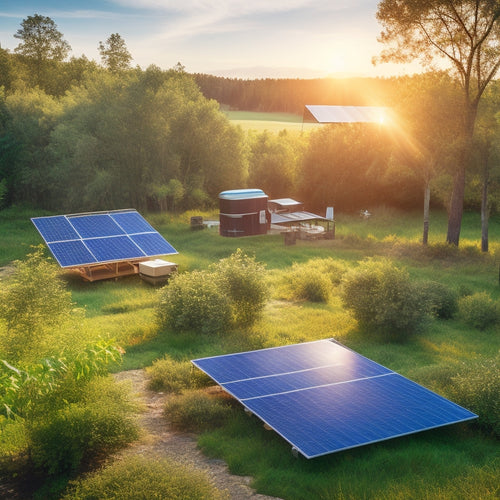
Why Homeowners Choose Renewable Energy Systems
Share
You're opting for renewable energy systems to harness the power of clean energy, reduce your reliance on the grid, and reap numerous financial and environmental benefits. By choosing renewable energy, you'll diminish your dependence on fossil fuels, reduce your carbon footprint, and contribute less to air pollution. You'll also lower your energy bills, gain control over your energy usage, and increase your property value. Plus, you'll benefit from government incentives that make the shift more accessible and affordable. As you take the first step towards a sustainable future, you'll discover even more advantages that await you.
Key Takeaways
• Homeowners choose renewable energy systems to reduce their carbon footprint and contribute to a sustainable future.
• Renewable energy systems lower energy bills by providing a higher energy output at a lower cost.
• Homeowners gain control over their energy usage and reduce their reliance on the grid with renewable energy systems.
• Government incentives, such as tax credits and rebates, make the transition to renewable energy more accessible and affordable.
• Installing renewable energy systems can increase property value by up to 17%, making them a desirable feature for environmentally conscious buyers.
Environmental Benefits Abound
By choosing renewable energy systems, you greatly diminish your dependence on fossil fuels, thereby reducing the amount of greenhouse gas emissions and air pollutants released into the atmosphere. This significant reduction in emissions directly translates to a decreased carbon footprint, which is a vital step towards sustainable living. As you switch to renewable energy, you're no longer contributing to the alarming rates of air pollution that threaten both human health and the environment.
In adopting renewable energy systems, you're taking a proactive stance against climate change. You're reducing your reliance on finite resources, instead opting for sustainable, eco-friendly alternatives. This conscious decision not only benefits the environment but also enhances your reputation as a responsible, forward-thinking individual.
Lowering Energy Bills Matters
Switching to renewable energy systems can greatly reduce your energy bills, as these eco-friendly alternatives often provide a higher energy output at a lower cost. By harnessing power from sources like solar or wind, you can notably decrease your reliance on the grid and lower your energy expenses.
With the installation of Smart Meters, you'll have real-time monitoring of your energy consumption, allowing you to optimize your energy usage and make data-driven decisions. Additionally, incorporating Energy Storage solutions, such as batteries, enables you to store excess energy generated during the day for use during periods of high demand or at night. This flexibility ensures that you maximize your energy independence and minimize your energy bills.
Energy Independence Is Key
With renewable energy systems, you gain control over your energy usage, allowing you to make conscious decisions about your energy consumption and reduce your reliance on the grid. This shift towards energy independence brings a sense of personal freedom, as you're no longer at the mercy of fluctuating energy prices and grid outages.
Here are just a few benefits of achieving energy independence:
-
Reduced reliance on the grid means you're less affected by power outages and grid failures, ensuring your home remains comfortable and secure.
-
Increased energy autonomy gives you the freedom to make choices about your energy usage, without being bound by traditional energy providers.
-
Improved community resilience is achieved as more homeowners become energy independent, creating a more decentralized and robust energy system.
Government Incentives Sweeten Deal
Government incentives, such as tax credits and rebates, greatly reduce the upfront cost of renewable energy systems, making the shift to energy independence more financially appealing.
As a homeowner, you can take advantage of these incentives to offset the initial investment in renewable energy systems. For instance, the Solar Investment Tax Credit (ITC) allows you to claim a tax credit of up to 26% of the total cost of your solar panel system. This can greatly reduce your tax liability, providing a welcome economic boost to your household.
Additionally, state and local governments offer rebates and other incentives that can further lower the upfront cost. By taking advantage of these government incentives, you can enjoy the benefits of renewable energy while also saving money.
With the cost of renewable energy systems decreasing over time, the combination of government incentives and declining costs makes the shift to renewable energy more accessible and affordable than ever.
Increased Property Value Result
As you invest in renewable energy systems, you can expect a significant boost to your property's value, which can be a major selling point if you decide to put your home on the market. This increased property value result is a key benefit of installing renewable energy systems, such as solar panels or wind turbines.
Here are some key advantages:
-
Appraisal boost: Installing renewable energy systems can increase your property's value by up to 17%, according to a National Renewable Energy Laboratory study. This means a higher selling price or increased collateral value.
-
Resale advantage: A renewable energy system can be a major differentiator for your property, making it more attractive to environmentally conscious buyers and setting it apart from comparable properties without such systems.
-
Long-term savings: Renewable energy systems can reduce energy costs over time, providing a tangible benefit to potential buyers and increasing your property's appeal.
Frequently Asked Questions
How Long Do Renewable Energy Systems Typically Last?
You can expect a renewable energy system to last around 25-30 years, but it depends on the type and quality of the system. Most systems come with a 10-25 year warranty coverage, guaranteeing a certain level of performance and system lifespan.
Can I Install a Renewable Energy System Myself?
Did you know that 80% of homeowners consider DIY solar installation a cost-effective option? While you can install a renewable energy system yourself, prioritizing DIY safety and personal satisfaction, it's important to weigh the pros and cons before taking on the project.
Are Renewable Energy Systems Noisy or Disruptive?
As you consider renewable energy systems, you'll be relieved to know that modern designs incorporate sound mitigation techniques, minimizing noise pollution, and ensuring a peaceful coexistence with your surroundings.
Can I Still Use Renewable Energy During a Power Outage?
During a power outage, you can still harness renewable energy with a grid-tied system, leveraging grid resiliency, or opt for energy autonomy with a battery-backed system, ensuring continuous power supply.
How Often Do Renewable Energy Systems Require Maintenance?
Like a well-oiled machine, your renewable energy system hums along smoothly - but only with regular inspections and energy audits, which you should conduct quarterly to guarantee peak performance and longevity of your system.
Related Posts
-

Smart Home Thermostats to Revolutionize Your Space
Smart home thermostats revolutionize your space by providing precise temperature control and optimizing energy saving...
-

Solar Powered Lights for Sustainable Home Decor
Solar-powered lights offer a stylish and eco-friendly way to enhance your home decor. They capture sunlight, converti...
-

Top Off Grid Solar Batteries for Renewable Energy
When seeking top off-grid solar batteries for renewable energy, consider options with advanced battery chemistry, suc...


